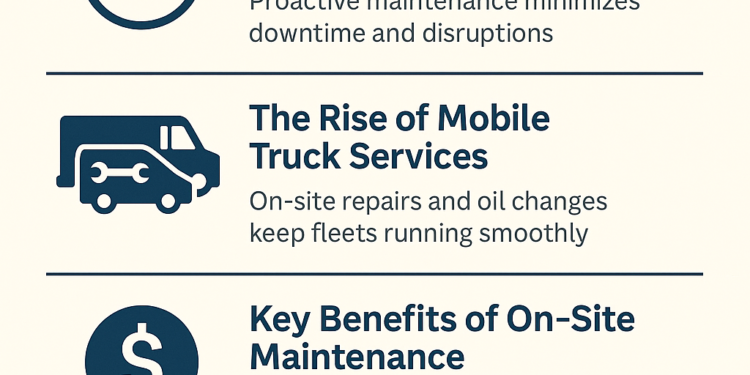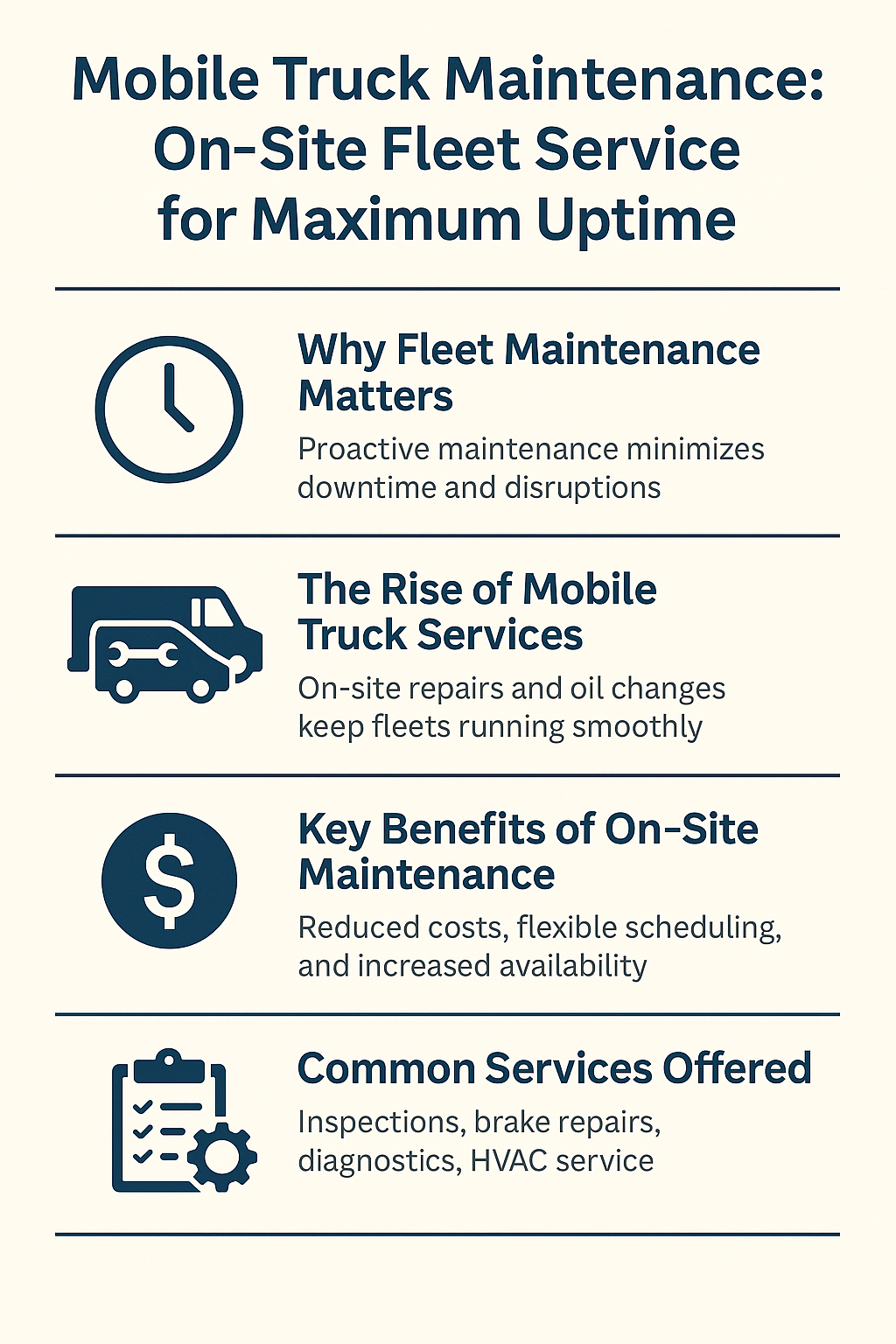Mobile Truck Maintenance Solutions for Modern Fleets

Keeping trucks in optimal condition is essential for fleet reliability and longevity. With the demands of long-haul routes and tight delivery schedules, unplanned breakdowns can disrupt operations and cause costly delays. Today’s fleets rely on proactive maintenance strategies that emphasize efficiency, flexibility, and convenience. As technology and logistics evolve, so does the need for smarter solutions that minimize downtime while ensuring every vehicle stays road-ready.
One growing approach focuses on bringing essential maintenance directly to where the trucks operate. Services such as mobile service and oil changes enable fleets to stay on schedule without sending vehicles to off-site shops. This approach enables technicians to perform routine maintenance on-site, ensuring engines run smoothly and minimizing disruptions to daily operations. By adopting these adaptable maintenance methods, fleet managers can streamline operations, improve performance, and reduce overall service-related disruptions.
Table of Contents
Benefits of Mobile Maintenance
Mobile truck maintenance services transform fleet management by offering expert repairs directly on-site, reducing vehicle downtime and increasing on-road time. This eliminates the need for transporting trucks to repair centers, reducing costs such as driver wages during downtime and logistical expenses. On-site services can be arranged outside peak hours to maximize fleet availability. Fleets gain the advantage of flexible scheduling tailored to their specific needs, allowing quick responses to unexpected breakdowns and enabling planned preventive maintenance to identify issues early and avoid costly repairs.
Common Services Offered
Most mobile truck maintenance providers offer a comprehensive range of services designed to keep commercial vehicles in peak performance. Core offerings typically include:
- Preventive maintenance inspections and checklists
- Routine oil and filter changes
- Brake system checks, repairs, and replacements
- Tire rotation, repair, and rebuilding
- Electrical diagnostics and troubleshooting
- HVAC and air conditioning service
Addressing these issues regularly is essential, since postponing repairs can rapidly lead to significant (and costly) mechanical failures. Fleet managers can also include services like battery replacement, lighting diagnostics, and emergency roadside assistance in their maintenance options, providing coverage for most breakdown situations on-site.

Technological Advancements
Telematics and computerized diagnostics have transformed truck maintenance. Field technicians now utilize wireless OBD-II scanners and cloud systems to quickly access real-time performance data, enabling faster and more precise repairs. These tools provide immediate fault codes, predictive alerts, and remote resets, reducing diagnostic times from hours to minutes. Digital platforms additionally make maintenance more efficient by allowing fleet managers to schedule, monitor, and pay for services through web or mobile apps.
Choosing the Right Service Provider
Evaluating mobile maintenance providers involves weighing several critical factors. First, inspect the provider’s full range of service offerings to ensure they match your fleet’s maintenance profile. Certification and up-to-date training are essential for technicians, as rapidly changing vehicle technology requires ongoing skills development. Check response time guarantees—fundamental in time-sensitive industries like freight and delivery.
Cost Considerations
Mobile maintenance services often cost more per visit than those in brick-and-mortar shops, but their broader economic impact is typically positive. The reduction in vehicle downtime often compensates for higher service charges, especially for fleets where time is a critical factor. Some providers offer pay-as-needed, no-contract options, which ease cash flow and allow for scaling. More information on these flexible models can be found in the trucking press, such as Transport Topics. Proactive maintenance saves money by preventing costly repairs. Comparing lost revenue from downtime to maintenance costs typically reveals net savings and improved asset utilization.
Future Trends
The mobile truck maintenance sector is undergoing a transformation driven by AI and automation. Fleet management tools now leverage predictive analytics, utilizing sensors and telematics, to anticipate service requirements and prevent failures. In the near future, proactive systems will notify managers in real time to minimize downtime. As electric and alternative-fuel vehicles become more prevalent, providers are developing expertise in batteries and sophisticated drivetrains. These changes emphasize the importance of adaptable, technology-driven maintenance approaches for commercial fleets.
Conclusion
Modern fleet success relies on operational efficiency, making mobile truck maintenance services essential for minimizing downtime and boosting asset value. By leveraging advanced technology and certified, responsive service partners, fleets can avoid disruptions and ensure vehicles are always ready. As expectations for uptime and customer service increase, embracing mobile maintenance provides the reliability and flexibility crucial for thriving in today’s competitive logistics industry.

